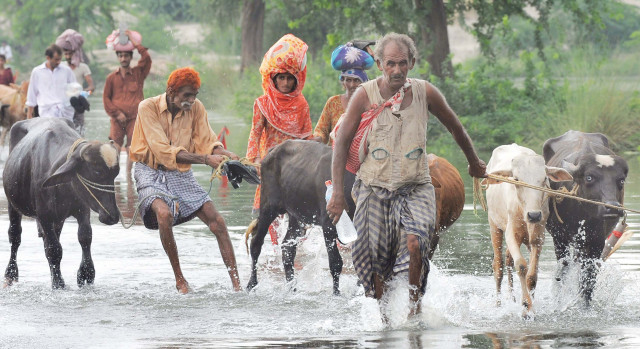FAO fears millions of animals may perish
Approximately 200,000 cows, sheep, buffaloes, goats and donkeys have already been confirmed dead or missing.

“The final numbers will be much higher, possibly into the millions,” warned the report.
“If you count poultry losses, then millions of animals have already died with the entire poultry stock wiped out in some areas,” highlighted the report.
FAO has also estimated that millions of surviving animals are now facing severe feed shortages, threatening generations of livestock.
“In good times people build up their herds and in bad times they sell livestock to generate cash. Every animal we save is a productive asset that poor families can use to rebuild their lives when the floods finally pass,” explained David Doolan, a senior FAO official in Pakistan.
“Livestock in this country are the poor people’s mobile ATM,” he summed up while talking about the impact of these losses on Pakistan’s rural population.
FAO officials have said that delivering fodder for livestock that have survived is the topmost priority at the moment.
Actual impact still unknown
“The impact of these losses will become evident to everyone when in two months sacrificial animals will not be available in markets,” said Tahir Pervez, General Secretary of the Meat Merchants Association.
Local meat merchants and livestock breeders are already issuing estimates of their own – much higher than those announced by the FAO.
They assert that the supply of cows, buffaloes, goats and sheep was also being constrained due to exports to Afghanistan.
“We have been pleading the government to stop export of livestock through western borders for many years now but given the present situation, they have to take action immediately,” he added.
Meat merchants are already calling for the import of animals from other countries.
Pervez pointed out that animals have been imported from Australia and New Zealand in the past. “If, instead, the government negotiates with India for import of livestock, we can obtain breeds similar to those found in Pakistan at much more affordable prices,” he asserted.
The Meat Merchants Association believes that about 0.4 million livestock have been killed by floods so far.
Other industry stakeholders are recommending caution.
“There are all sorts of estimates right now from 0.9 million downwards,” commented CEO of Engro Foods, Sarfaraz Rehman. “We have to wait till the water subsides before we can reach an authentic figure.”
He also stressed that prices of packaged milk and dairy products have not been increased. Regarding over pricing of these products in some areas, Rehman responded: “Milk is short in some places on account of transport issues but these will be addressed within the next few days.”
“We have estimated losses between Rs6 and Rs7 billion in Khyber-Pakhtunkhwa alone. The number is even higher for Punjab and Sindh,” lamented Mian Mazhar from the Pakistan Dairy Development Company (PDDC).
He revealed that PDDC workers are liaising with University of Veterinary and Animal Sciences in Lahore to distribute animal vaccines in affected areas. He contended that while resources are available, reaching the most affected regions is the biggest challenge at present.
UN aid call
The UN has asked for $5.7 million in emergency assistance for livestock. The FAO has mobilised $1.4 million from its funds for the procurement of feed and animal health vaccines. The FAO report also announced that the organisation will request additional support for the sector once the full scale of needs is better known.
However, they warned that transporting feedstuff to affected areas will also be a daunting task.
The report pointed out that although cereal grains and pulses can be used to feed livestock, the same are also in high demand to feed millions of human victims of the floods.
FAO has requested medical aid for animals to prevent the spread of epidemics in surviving animals.
Published in The Express Tribune, August 21st, 2010.



















COMMENTS
Comments are moderated and generally will be posted if they are on-topic and not abusive.
For more information, please see our Comments FAQ